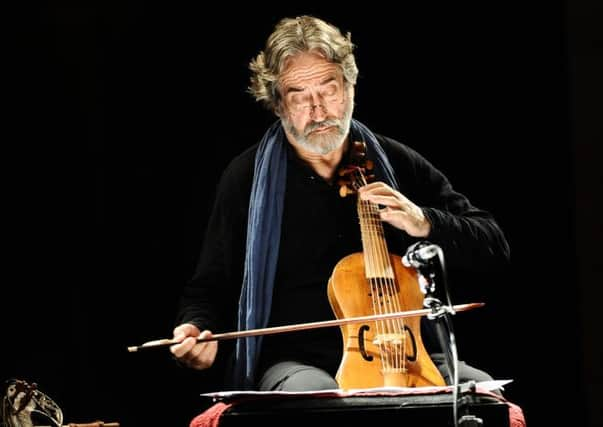Early music guru will open festival


Conductor, composer and viol player Jordi Savall is a living legend who has for the past forty years been the top selling name in the world of Early Music, though, as he relates in a rare interview, it was more by accident than design that he ever became involved.
“I was six years old when I was persuaded to join the school choir in my home town in Catalonia and it seems from that moment my future was in music.
Advertisement
Hide AdAdvertisement
Hide Ad“Twelve years later I went to the Barcelona Conservatory to study the cello, and there I found that some of the pieces I was playing were arrangements of music originally written for the viol, an instrument that had long been forgotten, and I began to wonder what it would have sounded like when it was first composed.
“That set me on the road to look for a bass viol, the parent of the modern cello, and which you hold and play in a very similar way, the main difference being that it has six strings and the cello has only four.
“That was not a major difficulty, as I had played the guitar when I was a young man, which also has six strings, so I basically knew the fingering required. I was then already twenty and just beginning to study music that I knew little about.”
Those were to be his first hesitant steps that eventually led to two years spent as a student of August Wenzinger in one of the few music schools specialising in those ‘strange instruments’ listened to by a quaint musical fringe.
Advertisement
Hide AdAdvertisement
Hide AdIn the years that followed he gathered around him some gifted young period instrumentalists, and in 1974 formed the group, Hesperion XX.
It was to receive highly favourable reviews in the specialist music media, and on a good night they would attract an audience of three or four hundred people mesmerised by the sheer virtuosity of Savall’s playing.
No one at the time could have foreseen that this world would be turned upside down by the film maker, Alain Corneau, who had recently read a book by Pascal Quignard regarding a group of remarkable viol players employed in the court of Louis XIV.
Headed by Sainte-Colombe and his pupil, Marin Marais, their story was full of intrigue, infighting and romantic excursions, and sparked the idea of the period dress film drama, Tous les matins du monde.
Advertisement
Hide AdAdvertisement
Hide AdAll Corneau had to do was to find a performer who could select the music and replicate the audacious technical virtuosity of the famous group. That person had to be Savall.
Most unexpectedly the film quickly gained an international cult status, the haunting music of the soundtrack appearing on a rush released disc that sold over a million copies, and dominated the UK ‘Classical Top 20’ chart for several months. .
“I suddenly found myself in demand in places like Japan and South Africa where the viol would never have been heard before,” continues Savall. “And now I was turned fifty years old and giving more than 150 concerts each year to large audiences in sold out concerts.”
Record labels were queuing up to issue discs of music very few people had ever heard before, and Savall’s discography quickly passed through the hundred mark before he decided to form his own label, Alia Vox, in 1998.
Advertisement
Hide AdAdvertisement
Hide AdTwo years later the UK’s National Center for Early Music (NCEM) opened in York and staged its first concerts in the beautifully restored church of St Margaret’s in Walmgate.
Now established as one of Europe’s most important annual events, this year’s Early Music Festival begins next Thursday with Savall and Hesperion XXI presenting a programme where East meets West.
“Nowadays I am able to go into an even wider geographical field of music,” Savall comments. “So that the instruments and members of Hesperion change from concert to concert.
“Last week it was four viols and an organ, and in York I will bring a group to create a colourful evocation of medieval music from around the Mediterranean.”
Advertisement
Hide AdAdvertisement
Hide Ad“In his field of music Savall is the world’s superstar and he has brought viol music to an audience that never knew it existed before,” says Delma Tomlin, the NCEM’s Administrative Director. “And in 2012 we presented him with the York Early Music Festival’s Lifetime Achievement Award.
“He has really become a performing phenomenon who everyone wants to see, though if you are unable to get a ticket for his opening concert, you can hear it in a broadcast on BBC Radio Three.”
As his lasting legacy he has, against all expectations in the music industry, created an interest in this ethereal music among young people, a fact that Tomlin can readily gauge by the number of entries she receives to take part in the York Early Music International Young Artists Competition that next year’s event drawing entries and will exceed all previous numbers.
And who will follow in Savall’s footsteps?
“There are so many fine groups around at the moment,” continues Tomlin, “but the three Zapoco brothers, who make up the group, Forma Antiqua, appear at the other end of the festival, and you certainly should not miss them – they are just fabulous.”
• York Early Music Festival, July 10 -19. Tickets on 01904 658338 or visit www.ncem.co.uk.